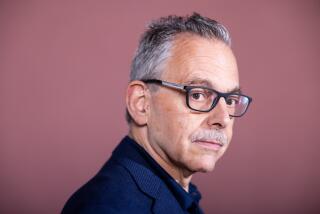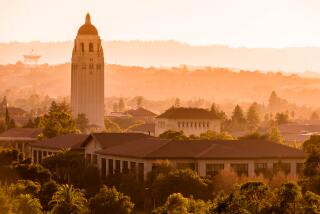A Gentleman and a Scholar : Aristocratic Ex-Priest Speaks Softly, Carries Big Stick for Evolution at UCI
- Share via
The patrician life that Francisco Ayala was born into 54 years ago taught that the truly meaningful existence was one where the mind was challenged by many pursuits but where a person was never too busy to treat others with kindness and civility.
It was the duty of the aristocrat to live out that credo, to pursue with equal zeal life’s mixed bounty of pleasure and poetry, scholarship and business. Although he left his native Spain as a young man and sought his way in America, Ayala has never forsaken the lessons learned as a boy in Madrid.
So while Ayala has become a renowned evolutionary biologist and was considered a prize catch a year ago by UC Irvine, he remains something of an anomaly in the world of U.S. higher education.
In a world where rumpled suits and scuffed shoes dominate, he wears Armani and Gucci. In a world where people usually don’t get rich, Ayala is a millionaire. In a Honda world, he drives a Cadillac.
In a world where other fine professors and scientists battle for office space that doesn’t have a partitioned wall, Ayala’s ninth-floor sanctuary is carpeted and appointed with custom furniture. In a world where single-minded devotion to one’s own academic specialty is common, Ayala eschews such behavior.
He owns 400 acres of vineyards in Northern California, is the major shareholder of a winery and owns stock in a horse-breeding operation. He loves the theater, opera and ballet and reads books on such diverse topics as history, art and philosophy. He has made an international reputation in genetics but said if the field were to be declared nonexistent tomorrow, he would be happy to move over to the philosophy department or liberal arts.
“I would guess that Francisco is the kind of person who would require more than one thing” to focus on, said Wyatt Anderson, an Ayala friend and professor of genetics at the University of Georgia. “What characterizes him is the breadth of his interests and accomplishments. He would be unlikely to say there is any one thing he could not do without. He might say, however, that doing one thing would not be enough.”
Ayala routinely gets by on a few hours of sleep a night and has taught himself to wake up without an alarm clock. He said his former wife told him he “had a remarkable ability to always forget unpleasant things.” Perhaps that’s why his blood pressure is low and why he never misses a day of work.
He spent 5 years in the priesthood until, he said, his intellectual side could no longer rationalize evil and human tragedy under the auspices of a supposedly loving God. As a result, he not only left the priesthood, he left the Roman Catholic church, never to return.
He was a major witness in an important 1982 trial in Arkansas, testifying against an Arkansas law that required that creationism be given equal time with the teaching of evolution in public schools.
“The greatest fraud the fundamentalists have committed is to make people believe that (the creationism-versus-evolution argument) is between God or religion on one side and science on the other,” Ayala said.
“My students come to me, and after they realize that evolution is something that cannot be doubted, they say, ‘Now I realize I have to give up my religion.’
“Although I’m not a religious person in my own life, I say, ‘For heaven’s sake, these two things are compatible.’ I don’t want to knock down religion. I don’t want to see science confronting religion.”
Yet, Ayala and attorneys fighting in Arkansas spent dozens of hours preparing their case. “I said then that more was at stake than science,” Ayala said in his campus office. “What was at stake was the survival of rationality in our country and certainly in our educational system. If we are going to allow this nonsense of something that is not science to be interpreted as science, the potential harmful effects go beyond this particular field of science.”
A federal judge in Arkansas struck down the law; a few years later, the U.S. Supreme Court also invalidated a similar law passed in Louisiana.
The fervor of Ayala’s opposition seems hard to square with his soft-spoken manner and his professed desire to diffuse his interests.
“Francisco the person is above all an aristocrat,” said a longtime friend and famed geneticist, G. Ledyard Stebbins, a professor emeritus at UC Davis.
“That means that he is impeccable in dress, he is polite, he is understanding, he is polished. All of those things. It’s something that comes naturally to a person of his station and upbringing. In democratic America, that can be mistaken for people who think he is a little bit of a snob.”
Ayala is, indeed, measured in his speech and not given to euphemisms or sillyisms in conversation. “I doubt he livens many of his lectures on evolution with jokes, which many of us do,” Stebbins said.
Stebbins, 82 and one of the so-called “nine old men” credited with synthesizing modern evolution theory in the 20th Century, marvels at Ayala’s self-control. “I have never seen him angry,” said Stebbins, who helped recruit Ayala for Davis in the early 1970s.
“I think it is his self-assurance. He’s never been in a position where he has not been sure of his position, of his future. He was born with a silver spoon in his mouth and has gone from one top position to another.”
Ayala studied under T.G. Dobzhansky, another of this century’s pillars of evolutionary biology. Ayala eventually directed research in Dobzhansky’s laboratory in New York. He is also a member of the National Academy of Sciences and has written about a dozen textbooks.
Of Ayala, Stebbins said, “To those of us who are really closest to him, we really appreciate his deep knowledge of evolutionary science, his breadth of understanding and his ability to reach out beyond his narrow field.”
Ayala has written extensively, for example, about the philosophical aspects of biology. In particular, his interest lies in those areas where philosophy and genetics intersect, such as the social and ethical implications of modern-day genetic research.
Ayala’s commingling of philosophy and science have deep roots, planted more than 30 years ago when he and a small group of university students in Franco’s Spain met regularly for years to discuss science, the arts, politics, theology and philosophy. During that period, Ayala said, his pluralistic interests developed, leading him first to religion.
He carried on with his interest in science during his 5 years as a Dominican priest that ended painfully. The break “wasn’t just over evolution,” he said, pointing to his head. “The problem was up here. There were some things I could not understand in the world,” most notably the birth of defective babies and the presence of evil.
He developed a philosophy tinged with his growing interest in existentialism--with its philosophy that the importance of life comes in the day-to-day living of it.
“I think the meaning of life is in life itself,” Ayala said, “as opposed to my mentor, Dobzhansky, who said he had to believe and did believe that things go somewhere, that you don’t take a train and just keep going. He felt the train had to go somewhere for the ride to be meaningful. For me it is not necessary. The ride itself is meaningful.”
At the core of that, Ayala said, is treatment of others. “Attentiveness and consideration to people around you, that’s the first obligation,” Ayala said. “Then another layer of obligation is in the professional realm and others you deal with.”
Ayala said he would consider his life worthy if he were judged to have treated others well and to have returned something to society. For that reason, he said, he gives a lot of public talks.
“I know it sounds trite in that I sound like such a nice guy in the way I describe myself,” Ayala said. “But that is the way I understand myself.”
Stebbins has a complaint, however. “People who know him intimately . . . just adore him. My only criticism is that I have almost given up asking him to criticize my scientific work. He always says it’s wonderful. He won’t criticize what I’m sure are its obvious faults. Maybe it’s just because he likes Mrs. Stebbins and myself and doesn’t want to offend us in any way.”
Denise Chilcote has worked for a year as Ayala’s administrative assistant. “I had never worked in a university before,” she said. “I had 15 years in retail, which is really cutthroat. This is like dying and going to heaven. He is just really personally courteous, and he has good manners. He doesn’t exert the least bit of pressure that he could, but people are so taken with his manner that they fall all over themselves trying to please him.”
She acknowledged that not everyone succumbs to the Ayala charm. “People, until they get to know him, could get turned off a bit and feel a little bit insecure in his presence, and they could turn that into envy. I think he’s the target of perhaps some envy among his peers on campus saying, ‘Who’s this coming in and getting all of this?’ Up until they get to know him, and he wins them over.”
Stebbins said Ayala wasn’t successful in winning everyone over at Davis. “He does tend to be a bit autocratic,” Stebbins said. “Some of the younger faculty with whom he tried to collaborate found that there was a tendency for them to do a lot of work and for him to take perhaps more of the credit than they thought he should.”
Others at Davis also thought that Ayala spent too much time on outside pursuits instead of trying to bolster the department at UCD, Stebbins added.
Stebbins and other scientists noted, however, that those are not uncommon laments among U.S. research scientists.
Ayala, who said he spends about one-third of his time out of town, said he hopes to remain at UCI for the rest of his career and hopes to make the department the country’s best.
Anderson said UCI’s work in the genetic and ecological aspects of evolutionary biology are already among the nation’s best.
Anderson ranks Ayala among the world’s “handful of leaders in modern genetics and evolution. Like everyone else, Francisco has picked up detractors along the way, and they would say he’s not that great, but his influence has been considerable, and he’s had students who have gone on to important jobs.”
For a man who once was content to live the life of a priest, that will be a remarkable legacy.
All of which Ayala viewed with some bemusement: “What I am trying to say is that I am sufficiently vain to think my brain might be second to nobody’s, but on the other hand, in terms of ambition, it never occurred to me that I would have had the success I have had.”






